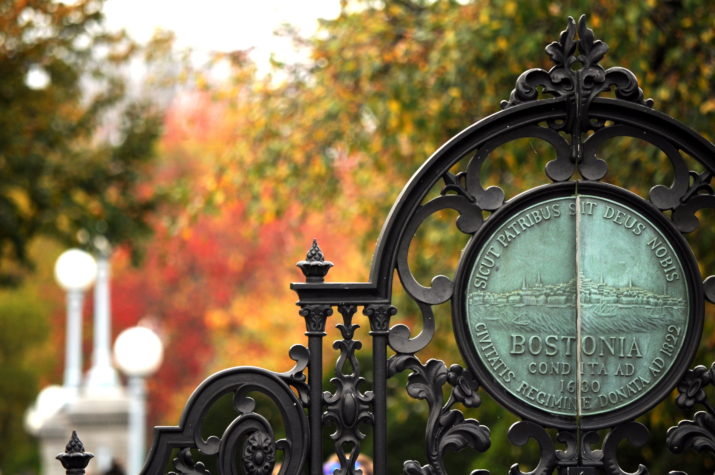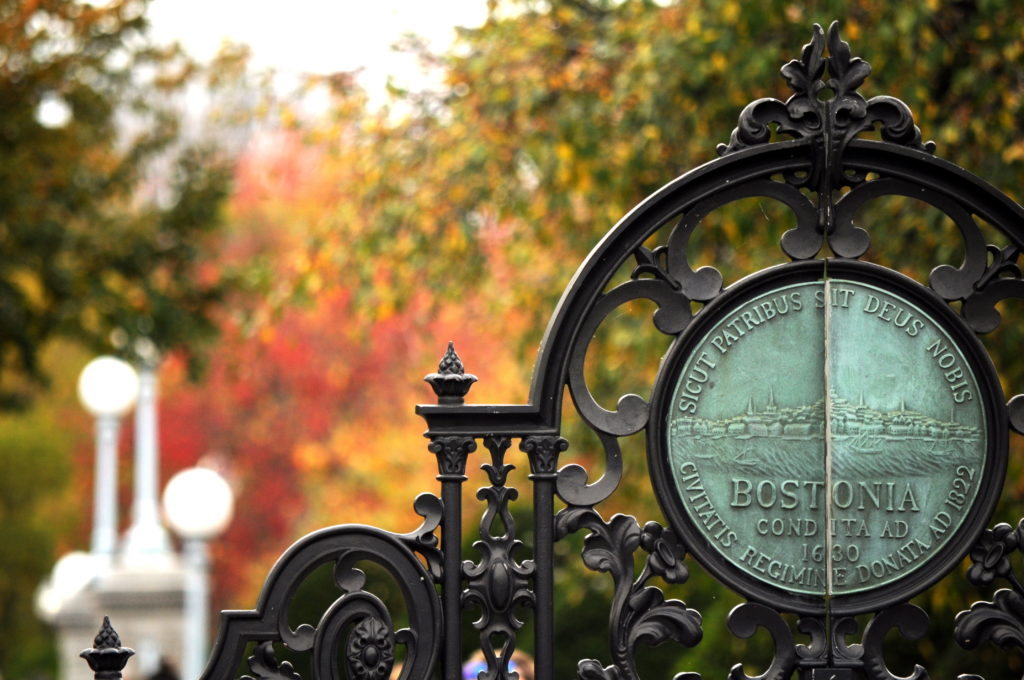

German author Esther Dischereit is currently residing in the United States. This is the second in a series of three letters, in which she describes the mood in the country under President Trump.
Translated from the German by Linda Frazee Baker.
Today I was awakened by the sound of a snow shovel. A path had been cleared below on Harvard Street, which goes past the famous Harvard Campus. Whoever graduates from Harvard knows that he will get a job. And that he or she is one of the brightest people in the country. Who wouldn’t want to belong to that club? Prominent people paid millions of dollars for fake profiles of their children and guaranteed acceptance into Yale, Stanford, and other universities. An outrageous scandal. Dozens of people are being investigated.
Watching the Oscars at Anna’s house was a kind of parlor game. This time none of the stars wore the “Time’s Up” button, symbol of the movement with which those who have been sexually harassed or abused have defended themselves against their abusers. That doesn’t mean that this subject isn’t still very much in the news. On the contrary: it has shown up in many places, most recently in the New York City Ballet.
Bars had invited the public to view the Oscar ceremony. I had typed correctly at least ten times: Bingo! Spike Lee, the director of BlacKkKlansman wins for the best adapted screenplay. By the next day his speech had gotten almost 1 million clicks on YouTube. He said: “Four hundred years. Our ancestors were stolen from Mother Africa and brought to Jamestown in Virginia, enslaved. . . . My grandmother Zimmie Shelton Retha was a Spelman College graduate although her mother had been a slave. . . .”
The guests at the gala rose to their feet and applauded. Spike Lee said: “Let’s do the right thing.” A standing ovation for John Lewis, representative in Congress from the Democratic Party and Afro-American activist, a man who is a legend. By the way, in New York there is a play on Broadway that was originally written by a young girl as her contribution to a statewide debating competition. Title: What the Constitution Means to Me. She stands on the stage today delivering her speech from that time. The play is perpetually sold out.
One could say the spirit of the Constitution was born in Boston. The Tea Party was planned in the Old South Meeting House. The decision of the British government to raise the tax on tea led to a decisive protest. A group of people stormed the ship and pushed its load over the side. Thousands watched respectfully from the banks. An act without violence. This started a chain of escalations that, in 1775, finally led to the outbreak of the American Revolution. The Republican Tea Party movement has overwritten the protest from those times with one that is neoconservative and right wing populist.
Boston is a very European city, and one of the three cities in the US where many Jewish people live, for example in Newton, a part of the city that is constantly growing. My friend Abigail invites me here to a kind of diner. She orders a Reuben sandwich with pastrami and sauerkraut. Hebrew salami is available in a supermarket across the way, a kosher salami. I ask her if we could also go in the Bistro next door. It’s “Jewishly,” she says, meaning it’s sort of kosher but not really. A mezuzah is mounted on the door of her house, a container for Scripture. An excerpt from the Torah is inside that may protect the house.
The State of Massachusetts was the first state to make slavery illegal. Slaves from the South who were able to flee via the Underground Railroad, often headed for Boston. Over one quarter of the population belonged to an association dedicated to fighting slavery. In the 1940s Malcolm X came here as a teenager. He was crazy about night clubs and ballrooms. In the end he landed in jail and after he was released he became one of the most important leaders of the Afro-American civil rights movement. He didn’t believe in Martin Luther King’s approach of nonviolent resistance. When he was murdered in New York in 1965, his friend James Baldwin spoke about what he signified. Recently excerpts were on view in an independent nonprofit film theater.
The words Let the People Rule can be found on an inscription in this city. This slogan, which Andrew Jackson proclaimed a long time ago, earned him the name of “Jackass” from his enemies. Since then, the Democrats are happy to use the image of a donkey in their campaigns. People come to this donkey and pet him. A bronze sculpture on which bare hands almost glue themselves for the cold. One of these “Jackasses” is John Kerry, a son of this city, who made climate change his cause under President Barack Obama. A champion of the Paris Agreement. Two years ago the Trump Administration terminated that, too.
Nevertheless, the Green New Deal probably can’t be stopped. The Sunrise Movement, composed of children and very young people, has persuaded 95 congressional representatives to condemn the government. They are active somewhere in the country once a week. They lay siege to representatives and behave in unpredictable ways. Sometimes they get arrested. They sing, shout slogans, make unusual speeches, and engage in civil disobedience.
Esther Dischereit, described by her publisher, Suhrkamp Verlag, as “possibly the preeminent German-Jewish voice of the post-Shoah generation,” lives in Berlin. She has published fiction, poetry and essays, as well as plays for radio and the stage. She is the founder of the avant-garde-project WordMusic and has worked as a curator for various projects in contemporary art/new media. Most recently she published “Flowers for Otello. On the crimes which came out of Jena,” a book and performance-project where her topic is a series of killings against mostly Turkish immigrants which took place in Germany between 1998 and 2011. She served as Chair for Contemporary Poetics at NYU in 2019.
Linda Frazee Baker is a writer and literary translator living in New York. Her fiction and creative nonfiction have appeared in the Michigan Quarterly Review, Drunken Boat, Sakura Review, and Folio. Her translations of German literature have been published in The Guardian, WebConjunctions, Asymptote, Metamophoses, InTranslation, and the Brooklyn Rail. She holds a master’s in fiction from Johns Hopkins.
This article was originally published in German in Deutschlandfunk
Kultur on March 20, 2019. It is reprinted with the kind permission of Deutschlandfunk Kultur.
Published on May 3, 2019.




